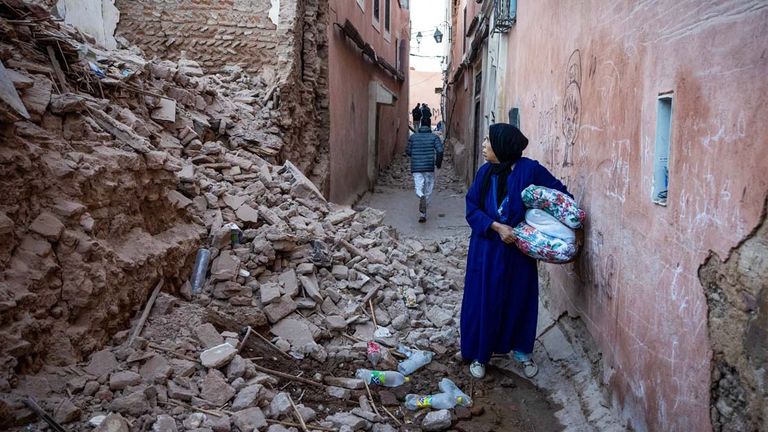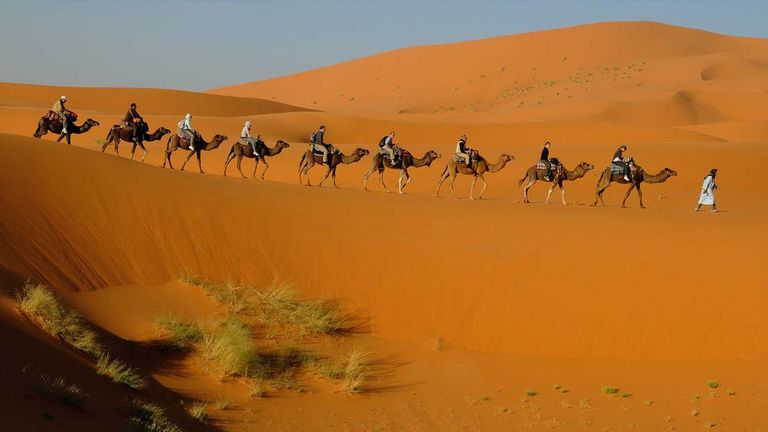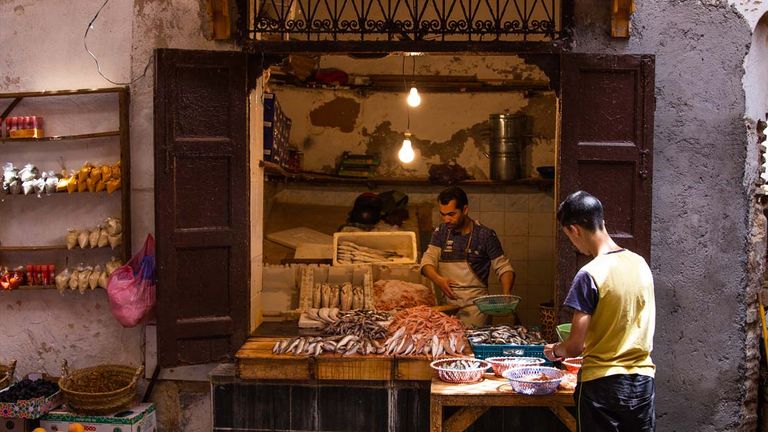Longtime travel advisor Ashley Les was asleep on Sept. 8 in a small Marrakech hotel when the magnitude 6.8 earthquake struck about 40 miles south in Morocco’s High Atlas Mountains.
"It was nothing that I ever want to experience again,” Les said, recalling how the violent quake jerked her awake. “I felt like I was in a shoebox that somebody was shaking around. It was absolutely terrifying.”
The Sept. 8 earthquake’s official death toll has since risen to nearly 3,000 people, while more than 5,600 others have been injured, according to figures released Sept. 14 by the Moroccan government. The search for victims continues in the rubble of many High Atlas Mountain villages that were destroyed during the natural disaster.
 Although Marrakech’s historic Medina did see some limited damage from the Sept. 8 quake, Morocco tourism officials said authorities have since secured those buildings.
Although Marrakech’s historic Medina did see some limited damage from the Sept. 8 quake, Morocco tourism officials said authorities have since secured those buildings.
Credit: 2023 Fadel Senna via GettyTravel Advisors Team Up for Disaster Relief
Les is a Virtuoso member and the owner of Postcards From (a Protravel-affiliated agency she now runs from Lisbon, Portugal) and she was in Marrakech for the Pure Life Experiences travel show, scheduled for Sept. 10-13 this year. That event was ultimately cancelled, but Les said when she and hundreds of other travel industry professionals — who were already in Marrakech for Pure — started to better understand the devastating scope of the earthquake’s destruction, they banded together to try and help.
"None of us are trained in disaster relief, so going into the thick of it would just be getting in the way,” Les said.
Instead, she and many other travel advisors joined up with a local aid foundation to go shopping at a large Marrakech warehouse store.
"We bought immediate supplies — everything from mattresses to baby diapers and formula to bags of couscous and rice to jugs of water,” Les said. “We collected truckloads — Sprinter vans full. And the hope was to offer some immediate relief, helping to get people food and water and a place to lay that wasn't on rocks.”
Les and other Pure travel pros also teamed up while they were in Marrakech to raise money for those impacted by the earthquake, reaching out to their tourism industry connections to bank nearly $200,000 in one day for local aid organizations. And while Les is still encouraging people to donate to ongoing disaster relief efforts in Morocco, she’s also trying to spread the word about how important it is for visitors to continue to travel to the destination.
 Tourism sellers are reminding travelers that just about all of Morocco’s most popular visitor attractions remain open, including Intrepid Travel’s Sahara Desert tour products.
Tourism sellers are reminding travelers that just about all of Morocco’s most popular visitor attractions remain open, including Intrepid Travel’s Sahara Desert tour products.
Credit: 2023 Intrepid Travel“Most (90%) of those people rely on tourism dollars solely, and if people aren't coming, you're falling into a bigger crisis than what was already done by the initial disaster,” said Les, who noted she saw very little damage during here several days in Marrakech, including within the town’s historic Medina district. “The country is fully open, the damage that you're seeing in Marrakesh is incredibly minimal, and it’s really important to encourage as many tourism dollars to flow into Morocco — now more than ever — to help them rebuild.”
Tourism Stakeholders Insist Morocco Is Safe
Officials at the Moroccan National Tourism Office indicated in a Sept. 14 statement that Marrakech has now largely returned to normal, saying “authorities have located and secured the few buildings that were damaged in the medina.”
Moroccan tourism officials also noted that a majority of the earthquake’s damage occurred in remote, rural regions within the Al Haouz province, south of Marrakech in the Atlas Mountains, and said the nation’s airports haven’t seen any significant schedule disruptions and flights have been operating normally.
“Throughout the country, public venues — such as restaurants, shops, cultural spaces and museums — continue to be open to visitors,” the Moroccan Tourism Office statement reads. “In summary, tourism activity continues at normal levels in all regions of the Kingdom.”
Marrakech is safe, and the decision to come is warmly welcomed by the local community.
Jean-Claude Messant, managing director of the Royal Mansour Marrakech, a 53-guestroom luxury property located in the medina, said his hotel wasn’t impacted by the earthquake, and the damage in Marrakech was minimal.
Much like Protravel’s Les, Messant also said those interested in helping Morocco should plan a vacation to the destination.
“Marrakech is safe, and the decision to come is warmly welcomed by the local community,” Messant insisted. “Tourists should not feel guilty about coming. They are wanted, and their visit will support the local economy. Apart from the High Atlas, there is no destination in Morocco that is off-limits to visitors. Traveling to Morocco overall is totally safe.”
Zina Bencheikh, Intrepid Travel’s Morocco-based managing director for Europe, the Middle East and Africa, also said the country’s most popular tourism destinations remain open to visitors and are operating normally.
From Meknes to Casablanca to Tangier to the Sahara Desert — all of these iconic spots are unaffected.
“From Meknes to Casablanca to Tangier to the Sahara Desert — all of these iconic spots are unaffected,” Bencheikh said. She added that the World Bank Group and the International Monetary Fund (IMF) announced this week that they are proceeding with plans to hold their annual meetings in Marrakech this October.
"If it wasn't safe, I can tell you that the people from the World Bank and IMF wouldn't be coming,” Bencheikh said, noting the international financial institutions’ annual meetings are expected to bring as many as 20,000 people to Marrakech next month. “That shows a lot about the resilience of the travel industry here in Morocco.”
Much More Help Is Needed
A native Moroccan, Bencheikh said she recently visited some of the High Atlas regions hardest hit by the Sept. 8 earthquake, noting that a few of her company’s tour products feature stops in some of the mountain villages that were devastated by the natural disaster.
“It's not nice to witness — it's really difficult,” Bencheikh said of what she saw. “For the ones who are still alive, most of them have lost their houses — or they are significantly damaged, so they're not safe to go back to. So, they're living in tents.”
Bencheikh did say she was heartened by the considerable humanitarian relief efforts she witnessed in the High Atlas, but she mentioned that winter is just around the corner, and those who suffered the earthquake’s worst effects will need blankets, warmer clothing and tents better suited for the cold.
 Tourism stakeholders in Morocco are working hard to remind consumers about just how important the travel industry is for the nation’s economy.
Tourism stakeholders in Morocco are working hard to remind consumers about just how important the travel industry is for the nation’s economy.
Credit: 2023 Intrepid Travel“That's why we’re reinforcing the message that the best thing that can happen to Morocco right now is to start visiting Morocco,” Bencheikh said. “A lot of these people and these families either work in agriculture or in tourism, so you find in each family someone works in a guest house and another that works as a [tour] guide. … It's important that we realize they've not only lost their houses, but they also lost their income and jobs because of what happened. They're impacted severely economically, and that’s why we're trying to promote the destination and make sure they can go back to normal life as soon as possible.”
The Royal Mansour Marrakech hotel’s Messant added, meanwhile, that his city also relies heavily on tourism, and his property has seen a slowdown in bookings and some cancellations following the earthquake.
Needless to say, if we face a tourism slowdown, this will certainly have a significant impact on the country’s economy.
“Needless to say, if we face a tourism slowdown, this will certainly have a significant impact on the country’s economy,” Messant explained.
Bencheikh said Intrepid’s Morocco booking pace has softened some for the rest of this year, but cancellations were at only 5% for October after reaching 17% thus far in September. Conceding her business had so far fared relatively well, she noted others across the country haven’t been as lucky, including adventure tour operators specializing in niche products in the High Atlas.
Bencheikh encouraged those wanting to help the regions dealing with the earthquake’s worst destruction to consider donations to Education for All and the High Atlas Foundation, two of Intrepid’s long-term and local NGO partners working now to provide essential provisions like food, shelter, clean water and medical supplies.
"And if you want to help Morocco, don't cancel your trip,” Bencheikh added. “Booking a trip, or not canceling your trip, will help Morocco recover faster. These people rely on tourism. Any of these families that are impacted — they have jobs in tourism. They have an involvement in tourism somehow.”